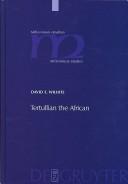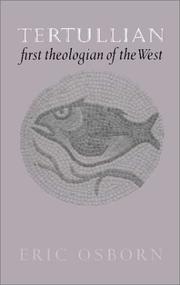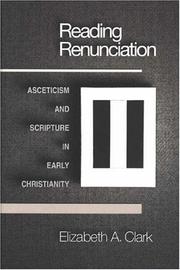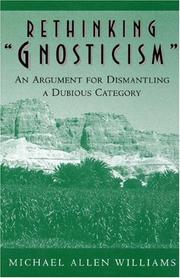| Listing 1 - 5 of 5 |
Sort by
|

ISBN: 9783110194531 3110194538 3110926261 9783110926262 Year: 2007 Volume: 14 Publisher: Berlin ; New York : De Gruyter,
Abstract | Keywords | Export | Availability | Bookmark
 Loading...
Loading...Choose an application
- Reference Manager
- EndNote
- RefWorks (Direct export to RefWorks)
Who was Tertullian, and what can we know about him? This work explores his social identities, focusing on his North African milieu. Theories from the discipline of social/cultural anthropology, including kinship, class and ethnicity, are accommodated and applied to selections of Tertullian's writings. In light of postcolonial concerns, this study utilizes the categories of Roman colonizers, indigenous Africans and new elites. The third category, new elites, is actually intended to destabilize the other two, denying any "essential" Roman or African identity. Thereafter, samples from Tertullian's writings serve to illustrate comparisons of his own identities and the identities of his rhetorical opponents. The overall study finds Tertullian's identities to be manifold, complex and discursive. Additionally, his writings are understood to reflect antagonism toward Romans, including Christian Romans (which is significant for his so-called Montanism), and Romanized Africans. While Tertullian accommodates much from Graeco-Roman literature, laws and customs, he nevertheless retains a strongly stated non-Roman-ness and an African-ity, which is highlighted in the present monograph.
Theology --- Ethnology --- Théologie --- Anthropologie sociale et culturelle --- Tertullian, --- Criticism and interpretation --- 276 =71 TERTULLIANUS, QUINTUS SEPTIMUS FLORENS --- Latijnse patrologie--TERTULLIANUS, QUINTUS SEPTIMUS FLORENS --- Tertullian. --- Tertullien --- Tertullian --- Théologie --- Tertullianus, Quintus Septimus Florens --- Tertulian, --- Tertuliano, --- Tertul·lià, --- Tertul·lià, Q. S. Florent, --- Tertulliano, --- Tertulliano, Q. S. F. --- Tertulliano, Quinto Settimio Fiorente, --- Tertullianus, Quintus Septimius Florens --- Tertullianus, Quintus Septimus Florens, --- Tertullien, --- Criticism and interpretation. --- African Christianity. --- Montanism. --- Roman Africa.

ISBN: 0521590353 0521524954 0511582889 0511002823 9780511002823 9780511582882 9780521590358 9780521524957 Year: 1996 Publisher: Cambridge : Cambridge University Press,
Abstract | Keywords | Export | Availability | Bookmark
 Loading...
Loading...Choose an application
- Reference Manager
- EndNote
- RefWorks (Direct export to RefWorks)
Tertullian was the first western Christian to write theology, defending Christians against the hostility of the Roman state, as well as arguing against Marcion, Praxeas and theosophical fantasy. A complex thinker, Tertullian has, in the modern era, been rejected by both liberal Christianity and its secular critics. But his ideas have become more accessible in our century, which has seen the destruction of Enlightenment beliefs that reason should lead to a quasi-mathematical system. The work of Gödel, Wittgenstein, Rorty and so many others has opened up the way for an understanding of Tertullian's passion for opposites, contingency and rational argument. For a long time misquoted and misused, Tertullian now calls for sustained analysis and interpretation. This book offers a major reappraisal of his theology and its influence on the shape of the western Christian tradition.
Theology, Doctrinal --- Théologie dogmatique --- History --- Histoire --- Tertullian, --- 276 =71 TERTULLIANUS, QUINTUS SEPTIMUS FLORENS --- -Christian doctrines --- Christianity --- Doctrinal theology --- Doctrines, Christian --- Dogmatic theology --- Fundamental theology --- Systematic theology --- Theology, Dogmatic --- Theology, Systematic --- Theology --- Latijnse patrologie--TERTULLIANUS, QUINTUS SEPTIMUS FLORENS --- -Doctrines --- Tertullian --- -Latijnse patrologie--TERTULLIANUS, QUINTUS SEPTIMUS FLORENS --- -Tertullian --- Tertullien --- Théologie dogmatique --- Tertulian, --- Tertuliano, --- Tertul·lià, --- Tertul·lià, Q. S. Florent, --- Tertulliano, --- Tertulliano, Q. S. F. --- Tertulliano, Quinto Settimio Fiorente, --- Tertullianus, Quintus Septimius Florens --- Tertullianus, Quintus Septimus Florens, --- Tertullien, --- Arts and Humanities --- Religion --- Theology, Doctrinal - History - Early church, ca. 30-600.

ISBN: 0691005117 0691005125 1400823188 1282753770 9786612753770 1400811244 9781400823185 1400801230 9780691005126 Year: 2001 Publisher: Princeton Princeton University Press
Abstract | Keywords | Export | Availability | Bookmark
 Loading...
Loading...Choose an application
- Reference Manager
- EndNote
- RefWorks (Direct export to RefWorks)
A study of how asceticism was promoted through Biblical interpretation, Reading Renunciation uses contemporary literary theory to unravel the writing strategies of the early Christian authors. Not a general discussion of early Christian teachings on celibacy and marriage, the book is a close examination, in the author's words, of how "the Fathers' axiology of abstinence informed their interpretation of Scriptural texts and incited the production of ascetic meaning." Elizabeth Clark begins with a survey of scholarship concerning early Christian asceticism that is designed to orient the nonspecialist. Section Two is organized around potentially troubling issues posed by Old Testament texts that demanded skillful handling by ascetically inclined Christian exegetes. The third section, "Reading Paul," focuses on the hermeneutical problems raised by I Corinthians 7, and the Deutero-Pauline and Pastoral Epistles. Elizabeth Clark's remarkable work will be of interest to scholars of late antiquity, religion, literary theory, and history.
248 "00/04" --- Asceticism --- -Ascetical theology --- Contempt of the world --- Theology, Ascetical --- Christian life --- Ethics --- Spiritualiteit. Ascese. Mystiek. Vroomheid--?"00/04" --- History --- -Asceticism --- Bible --- Criticism, interpretation, etc. --- Biblia --- Asceticism - History - Early church, ca 30-600 --- Acts of Paul and Thecla. --- Acts of Thomas. --- Adultery. --- Allegory. --- Ambrosiaster. --- Anchorite. --- Apologetics. --- Apostasy. --- Arianism. --- Asceticism. --- Basil of Ancyra. --- Basil of Caesarea. --- Bible. --- Body of Christ. --- Book of Judges. --- Book of Wisdom. --- Celibacy. --- Chastity. --- Christian Order. --- Christianity. --- Church Fathers. --- Clement of Alexandria. --- Clerical celibacy. --- Concupiscence. --- Consummation. --- Contra Celsum. --- Conversion to Christianity. --- Criticism of marriage. --- De fide. --- Dialogue with Trypho. --- Dispensation (canon law). --- Docetism. --- Donatism. --- Elijah. --- Epistle to the Ephesians. --- Evagrius Ponticus. --- Exegesis. --- Ezekiel. --- Fear of God. --- First Epistle to the Corinthians. --- Fornication. --- Gluttony. --- God. --- Helvidius. --- Heresy. --- Heterodoxy. --- Holiness code. --- Idolatry. --- Incest. --- Incorruptibility. --- Indulgence. --- Infidel. --- Jews. --- John Cassian. --- John Chrysostom. --- Jovinian. --- Judaizers. --- Justification (theology). --- Justin Martyr. --- Lactantius. --- Manichaeism. --- Marcion of Sinope. --- Marcionism. --- Matthew 25. --- Melania the Elder. --- Midrash. --- Monasticism. --- Montanism. --- New Testament. --- Old Testament. --- Origen. --- Paganism. --- Parable of the Great Banquet. --- Parable of the Ten Virgins. --- Paulinus of Nola. --- Pelagianism. --- Progressive revelation (Bahá'í). --- Rebuke. --- Religion. --- Religious text. --- Renunciation. --- Rule of Faith. --- Sacramentum (oath). --- Self-denial. --- Sexual Desire (book). --- Sexual abstinence. --- Sirach. --- Sola fide. --- Spiritual marriage. --- Spirituality. --- Spouse. --- Superiority (short story). --- Susanna (Book of Daniel). --- Tertullian. --- The City of God (book). --- Theodore of Mopsuestia. --- Theology. --- Thomas the Apostle. --- Thou shalt not commit adultery. --- Virginity.

ISBN: 0691005427 0691011273 1400822211 1282753193 9786612753190 1400813832 9781400822218 1400808537 9780691011271 Year: 1999 Publisher: Princeton, N.J. : Princeton University Press,
Abstract | Keywords | Export | Availability | Bookmark
 Loading...
Loading...Choose an application
- Reference Manager
- EndNote
- RefWorks (Direct export to RefWorks)
Most anyone interested in such topics as creation mythology, Jungian theory, or the idea of "secret teachings" in ancient Judaism and Christianity has found "gnosticism" compelling. Yet the term "gnosticism," which often connotes a single rebellious movement against the prevailing religions of late antiquity, gives the false impression of a monolithic religious phenomenon. Here Michael Williams challenges the validity of the widely invoked category of ancient "gnosticism" and the ways it has been described. Presenting such famous writings and movements as the Apocryphon of John and Valentinian Christianity, Williams uncovers the similarities and differences among some major traditions widely categorized as gnostic. He provides an eloquent, systematic argument for a more accurate way to discuss these interpretive approaches. The modern construct "gnosticism" is not justified by any ancient self-definition, and many of the most commonly cited religious features that supposedly define gnosticism phenomenologically turn out to be questionable. Exploring the sample sets of "gnostic" teachings, Williams refutes generalizations concerning asceticism and libertinism, attitudes toward the body and the created world, and alleged features of protest, parasitism, and elitism. He sketches a fresh model for understanding ancient innovations on more "mainstream" Judaism and Christianity, a model that is informed by modern research on dynamics in new religious movements and is freed from the false stereotypes from which the category "gnosticism" has been constructed.
Gnosticism. --- Rome --- Religion. --- Gnosticism --- 273.1 --- 273.1 Gnosis. Gnosticisme --- Gnosis. Gnosticisme --- Religion --- Cults --- Rome - Religion --- Against the Galilaeans. --- Agrippa Castor. --- Anchorite. --- Anthropomorphism. --- Anti-Judaism. --- Antinomianism. --- Antipope. --- Apocalypse. --- Apocrypha. --- Apocryphon. --- Apostasy. --- Asceticism. --- Blasphemy. --- Borborites. --- Cainites. --- Catharism. --- Celibacy. --- Cerdo (gnostic). --- Cerinthus. --- Christian Identity. --- Christian fundamentalism. --- Christianity. --- Church Fathers. --- Clement of Alexandria. --- Consubstantiality. --- Contra Celsum. --- Creation myth. --- Demiurge. --- Demonization. --- Dialogue with Trypho. --- Divine Spark. --- Doctrine. --- Elohim. --- Epiphanes (gnostic). --- Epistle to the Laodiceans. --- Ernst Troeltsch. --- Exegesis. --- Exorcism. --- False prophet. --- God. --- Good and evil. --- Gospel of Eve. --- Gospel of Philip. --- Heresy of the Free Spirit. --- Heresy. --- Heterodoxy. --- Holy Book of the Great Invisible Spirit. --- Ideal type. --- Incorruptibility. --- Infidel. --- Irenaeus. --- Jews. --- Judaism. --- Judas Iscariot. --- Justification (theology). --- Justin Martyr. --- Manichaeism. --- Marcion of Sinope. --- Marcionism. --- Martyr. --- Metempsychosis. --- New religious movement. --- Nicolaism. --- Orthodox Judaism. --- Plotinus. --- Predestination. --- Problem of evil. --- Pseudo-Philo. --- Puritans. --- Pythagoreanism. --- Reform Judaism. --- Religious text. --- Renunciation. --- Sacred prostitution. --- Satan. --- Sect. --- Secularization. --- Self-denial. --- Sethianism. --- Sexual Desire (book). --- Sexual abstinence. --- Simon Magus. --- Skepticism. --- Sophia (Gnosticism). --- Spiritual marriage. --- Spirituality. --- Superiority (short story). --- Tertullian. --- The Other Hand. --- Theodicy. --- Theodotus of Byzantium. --- Theology. --- Thou shalt not commit adultery. --- Thou shalt not covet. --- Tractate. --- Wickedness. --- Writing. --- Zostrianos.
Book
ISBN: 0691631689 1400863910 Year: 2014 Publisher: Princeton, NJ : Princeton University Press,
Abstract | Keywords | Export | Availability | Bookmark
 Loading...
Loading...Choose an application
- Reference Manager
- EndNote
- RefWorks (Direct export to RefWorks)
The first woman known to have written in English, the fourteenth-century mystic Julian of Norwich has inspired generations of Christians with her reflections on the "motherhood" of Jesus, and her assurance that, despite evil, "all shall be well." In this book, Denise Baker reconsiders Julian not only as an eloquent and profound visionary but also as an evolving, sophisticated theologian of great originality. Focusing on Julian's Book of Showings, in which the author records a series of revelations she received during a critical illness in May 1373, Baker provides the first historical assessment of Julian's significance as a writer and thinker.Inscribing her visionary experience in the short version of her Showings, Julian contemplated the revelations for two decades before she achieved the understanding that enabled her to complete the long text. Baker first traces the genesis of Julian's visionary experience to the practice of affective piety, such as meditations on the life of Christ and, in the arts, a depiction of a suffering rather than triumphant Christ on the cross. Julian's innovations become apparent in the long text. By combining late medieval theology of salvation with the mystics' teachings on the nature of humankind, she arrives at compassionate, optimistic, and liberating conclusions regarding the presence of evil in the world, God's attitude toward sinners, and the possibility of universal salvation. She concludes her theodicy by comparing the connections between the Trinity and humankind to familial relationships, emphasizing Jesus' role as mother. Julian's strategy of revisions and her artistry come under scrutiny in the final chapter of this book, as Baker demonstrates how this writer brings her readers to reenact her own struggle in understanding the revelations.Originally published in 1994.The Princeton Legacy Library uses the latest print-on-demand technology to again make available previously out-of-print books from the distinguished backlist of Princeton University Press. These editions preserve the original texts of these important books while presenting them in durable paperback and hardcover editions. The goal of the Princeton Legacy Library is to vastly increase access to the rich scholarly heritage found in the thousands of books published by Princeton University Press since its founding in 1905.
Mysticism --- History --- Aelred of Rievaulx. --- Aevum. --- Affective piety. --- Allusion. --- Analogy. --- Anchorite. --- Anno Domini. --- Anselm of Canterbury. --- Archetype. --- Augustine of Hippo. --- Augustinian theodicy. --- Augustinians. --- Bernard McGinn (theologian). --- Bernard of Clairvaux. --- Body of Christ. --- Canonical hours. --- Catharism. --- Christian. --- Christology. --- Church Fathers. --- Cistercians. --- Contrition. --- Curate. --- Damnation. --- Deity. --- Divine grace. --- Dualism. --- El Shaddai. --- Elaine Pagels. --- Erudition. --- Exegesis. --- Felix culpa. --- Glorification. --- God the Father. --- God the Son. --- God. --- Grace Jantzen. --- Hagiography. --- Hermeneutics. --- Hilda of Whitby. --- Iconography. --- Image of God. --- Immanence. --- Intercession. --- John Hick. --- John Meyendorff. --- John of Beverley. --- Julian May. --- Julian of Norwich. --- Justification (theology). --- Litany. --- Luttrell Psalter. --- Manichaeism. --- Manifestation of God. --- Margery Kempe. --- Mary Magdalene. --- Meister Eckhart. --- Messiah. --- Metonymy. --- Mysticism. --- Neoplatonism. --- Norwich Cathedral. --- Omnipotence. --- Omniscience. --- Origen. --- Parable. --- Patristics. --- Pelagianism. --- Penitential. --- Pierre Teilhard de Chardin. --- Plotinus. --- Predestination. --- Prevenient grace. --- Problem of evil. --- Propitiation. --- Pseudo-Dionysius the Areopagite. --- Purgatory. --- Ralph Manheim. --- Religion. --- Reprobation. --- Richard Rolle. --- Salvation. --- Sanctification. --- Scholasticism. --- Sermon. --- Sola gratia. --- Soteriology. --- Spirituality. --- Tertullian. --- The Book of Margery Kempe. --- The Mirror of Simple Souls. --- The Parson's Tale. --- Theodicy. --- Theology. --- Thomas Aquinas. --- Thomism. --- Treatise. --- Venial sin. --- Walter Hilton. --- William of Ockham.
| Listing 1 - 5 of 5 |
Sort by
|

 Search
Search Feedback
Feedback About
About Help
Help News
News